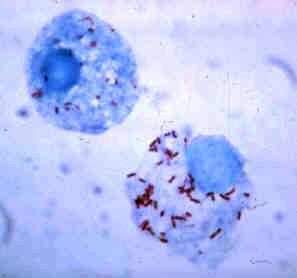Typhus facts for kids
Typhus is a name for several diseases caused by tiny living things called bacteria. These bacteria are special because they are parasites. This means they need to live inside another living thing to survive. They cannot live on their own outside a host. The hosts for these bacteria can be fleas (often found on rats), tiny mites (on rodents and humans), or lice (on humans). When most people talk about typhus, they usually mean a type spread by lice. The word "typhus" comes from an old Greek word meaning "smoky" or "hazy." This describes how people with the disease might feel confused or unclear in their minds.
Typhus is not related to typhoid fever or paratyphoid fever. These are different illnesses.
Contents
What Causes Typhus?
Typhus is caused by a group of bacteria called Rickettsiae. These bacteria are very small. They are parasites, which means they must live inside other living things to survive. They cannot live freely in the environment.
How Does Typhus Spread?
The Rickettsiae bacteria are usually spread to humans by small insects or mites. These tiny creatures are called "vectors."
- Lice: One common type of typhus is spread by human body lice. When a louse bites a person who has the bacteria, the louse becomes infected. If that louse then bites another person, it can pass the bacteria to them.
- Fleas: Another type of typhus is spread by fleas, especially those found on rats. If an infected flea bites a human, it can transmit the disease.
- Mites: Some types of typhus are spread by tiny mites, often found on rodents like mice or rats. These mites can bite humans and pass on the bacteria.
What Happens When Someone Gets Typhus?
When a person gets typhus, they might feel very sick. The symptoms can include a high fever, headaches, and a rash. People might also feel confused or hazy in their thoughts, which is how the disease got its name.
How is Typhus Treated?
The good news is that typhus can be treated. Doctors use special medicines called antibiotics to fight the bacteria. It is important to get treatment early to help people recover quickly and prevent serious problems.
See also
 In Spanish: Tifus para niños
In Spanish: Tifus para niños
 | May Edward Chinn |
 | Rebecca Cole |
 | Alexa Canady |
 | Dorothy Lavinia Brown |


